
Manu Chao is a French-Spanish singer, songwriter and guitarist. He sings in French, Spanish, English, Italian, Arabic, Catalan, Galician, Portuguese, Greek, and occasionally in other languages. Chao began his musical career in Paris, busking and playing with groups such as Hot Pants and Los Carayos, which combined a variety of languages and musical styles. With friends and his brother Antoine Chao, he founded the band Mano Negra in 1987, achieving considerable success, particularly in Europe. He became a solo artist after its breakup in 1995 and since then has toured regularly with his live band, Radio Bemba.
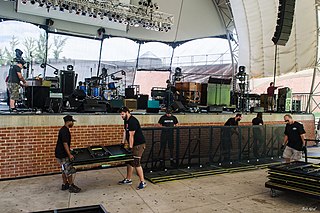
The road crew are the support personnel who travel with an artist or band on tour, usually in sleeper buses, and handle every part of the concert productions except actually performing the music with the musicians. This catch-all term covers many people: tour managers, production managers, stage managers, front of house and monitor engineers, lighting directors, lighting designers, lighting techs, guitar techs, bass techs, drum techs, keyboard techs, pyrotechnicians, security/bodyguards, truck drivers, merchandise crew, and caterers, among others.
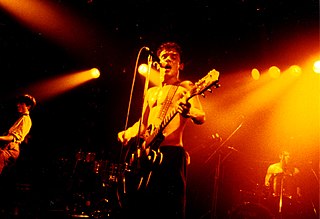
Mano Negra was a French music group active from 1987 to 1994 and fronted by Manu Chao. The group was founded in Paris by Chao, his brother Antoine and their cousin Santiago, all born of Galician and Basque parents with partly Cuban roots. Their songs were mostly in Spanish, English and French, often switching from one language to the other in the same song or in the middle of a sentence or title. They also had a hit song in Arabic. They are considered pioneers of world fusion.

Los Carayos was a French band which released four albums between 1986 and 1994. They were active mostly in Paris in the mid-1980s, but side interests of the musicians, notably of Manu Chao, did not allow the band to take off.
Ramón Luís Chao Rego was a Spanish journalist and writer. He won the Premio de Virtuosismo for Piano in 1955. The same year he moved to Paris, France to study music with Nadia Boulanger and Lazare Lévy. In 1960 he began his collaboration with the RTF's Iberian languages Service. He was head of this service ten years later. At the same time he was collaborating with the Spanish weekly Triunfo, the monthly Le Monde Diplomatique, and the daily newspapers Le Monde and La Voz de Galicia.
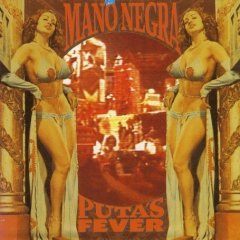
Puta's Fever is the second studio album by Mano Negra, released in 1989. The French edition of Rolling Stone magazine named it the 8th greatest French rock album.

King of Bongo is the third studio album by Mano Negra, released in 1991. The French edition of Rolling Stone magazine named it the 61st greatest French rock album.

In the Hell of Patchinko is a live album by Mano Negra; it was recorded on 2 November 1991 in Club Citta, Kawasaki, Japan with mobile studio "Sound Creaters" and released on 9 November 1992.

Mano Negra Illegal is a tribute album to the French world/punk band Mano Negra, released in 2001 on the Big Mama label.
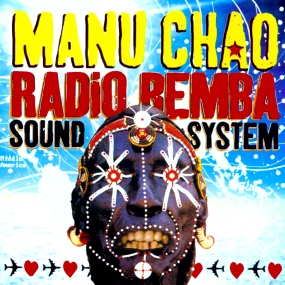
Radio Bemba Sound System is a live album by Manu Chao that was released in 2002. It is the accompanying CD to the performer's live DVD Babylonia en Guagua, filmed over two nights in 2001 during the tour for Proxima Estacion: Esperanza. Many of the songs found on Radio Bemba Sound System, such as "Machine Gun", "Peligro","Mala Vida","King Kong Five" and "The Monkey", are songs originally recorded by Manu Chao's previous band, Mano Negra. However the arrangements performed with Radio Bemba Sound System are more reggae-, ska-, and rock-oriented. The album is sequenced and edited in such a way that there is very little audience noise and cheering between the tracks, thus giving the impression of an all-night happy party - which calms down in the penultimate track only to explode again in the last one ("Promiscuity"); the cheering at the end of "Promiscuity" is cut short by a very early fade.
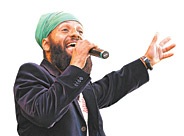
Todos Tus Muertos is a rasta-punk band from Argentina formed in Buenos Aires, in 1985. The longtime line-up comprised by a young vocalist Fidel Nadal, Horacio "Gamexane" Villafañe on guitar, Felix Gutiérrez on bass, and drummer Pablo Potenzoni. They achieved international success throughout the 1990s. The band was part from the second Argentine punk movement that emerged during the mid-1980s. By 2015, a reunion show was announced with Fidel Nadal, Felix Gutiérrez and Pablo Molina at the Jamming Festival in Bogotá, Colombia on 5 June 2016, and more recently three more show in Chile and Mexico.

Les Wampas are a French punk rock/psychobilly band, who refer more exactly to their music as "Yé-yé-punk". The band was formed in Paris in 1983.
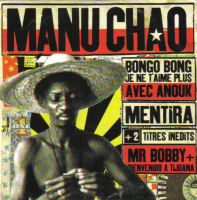
"Bongo Bong" is the first solo single by Manu Chao, from his debut album, Clandestino. It is a remake of "King of Bongo", a track from Manu Chao's previous band, Mano Negra. The title and lyrics are taken from the 1939 jazz song "King of Bongo Bong" by Black American trumpeter Roy Eldridge. It also uses the background music from Black Uhuru's song "Bull ina di Pen", from their 1984 album, Anthem. The song is part of a medley with "Je ne t'aime plus" on Clandestino. Moreover, the music has been reused for other songs, such as "Mr. Bobby", which was first released on this single before being re-recorded for Chao's second album, Próxima Estación: Esperanza, and "Homens", from the same record.

La Radiolina is the fourth studio album by Manu Chao. It was released on 4 September 2007. Italy saw an advance release of the album on 30 August.

Karamelo Santo is a Latin rock band from Mendoza, Argentina. Formed in 1992 for Goy Karamelo, they released their first album, La Kulebra in 1995. Since then, they have released nine more albums. The single "Que No Digan Nunca" is probably their best-known song. It was used on the soundtrack for the movie Caño Dorado.

La Mano Ajena is a Chilean band founded in 2002 that mixes rhythms from Eastern Europe, Latin America, France and Russia, blending all these sounds in a pastiche that also unites the tendencies of each member of the band: rock, punk, Latin American folklore and theater music. This musical project is unique in Chile, and its hybrid sound has been called "klezmer a la chilena" by press.

Red Cardell is a French, Breton rock band, that mixes Breton music with rock, folk, blues, world music and chanson réaliste.

Bandabardò is an Italian folk rock band, it was formed in 1993.
"Mala Vida" is the second single by French rock group Mano Negra, appearing on their 1988 debut album Patchanka. Written by lead singer Manu Chao, the song also appeared on a 1984 demo tape of the same name by Hot Pants, a predecessor to Mano Negra. "Mala Vida" was an early hit for Mano Negra and became a staple of the band's live shows and has been covered by several artists. The song has also been performed by Chao as a solo artist; a live performance of the song by Chao was recorded for his 2002 album Radio Bemba Sound System. Boucherie Productions, who published Patchanka, financed a music video for the song, which received airplay on national radio stations and TV channels in France. Mano Negra's success with the release of "Mala Vida" led the band to a contract with Virgin.

The Black Hand was a presumed secret, anarchist organization based in the Andalusian region of Spain and best known as the perpetrators of murders, arson, and crop fires in the early 1880s. The events associated with the Black Hand took place in 1882 and 1883 amidst class struggle in the Andalusian countryside, the spread of anarcho-communism distinct from collectivist anarchism, and differences between legalists and illegalists in the Federación de Trabajadores de la Región Española.


















